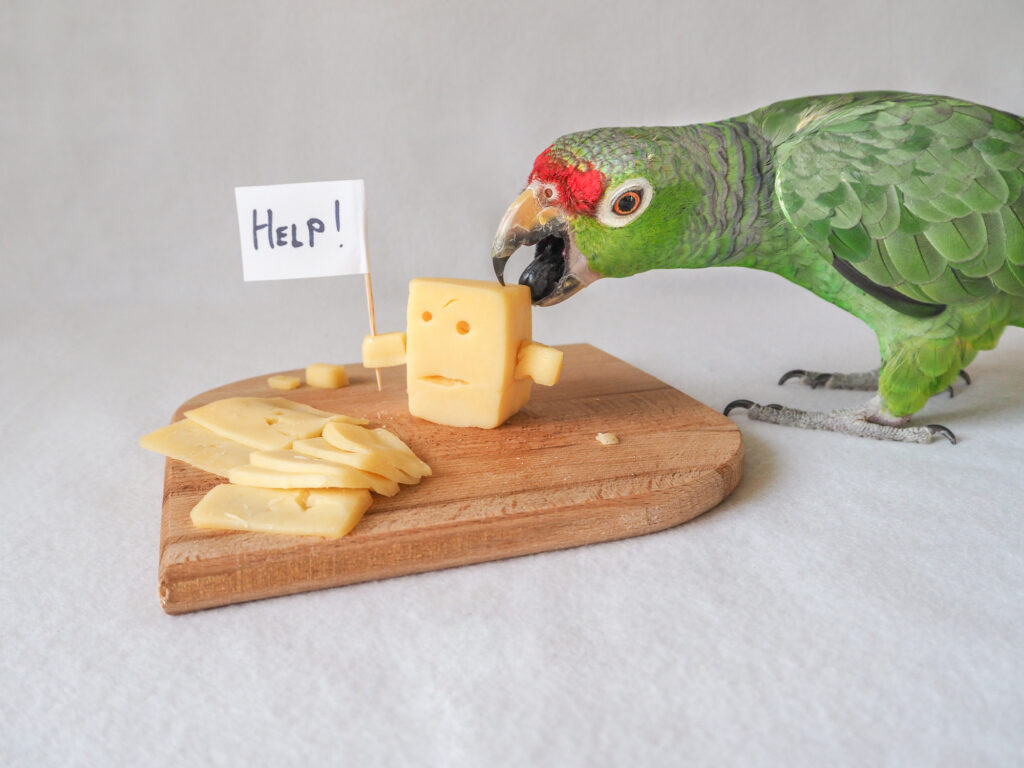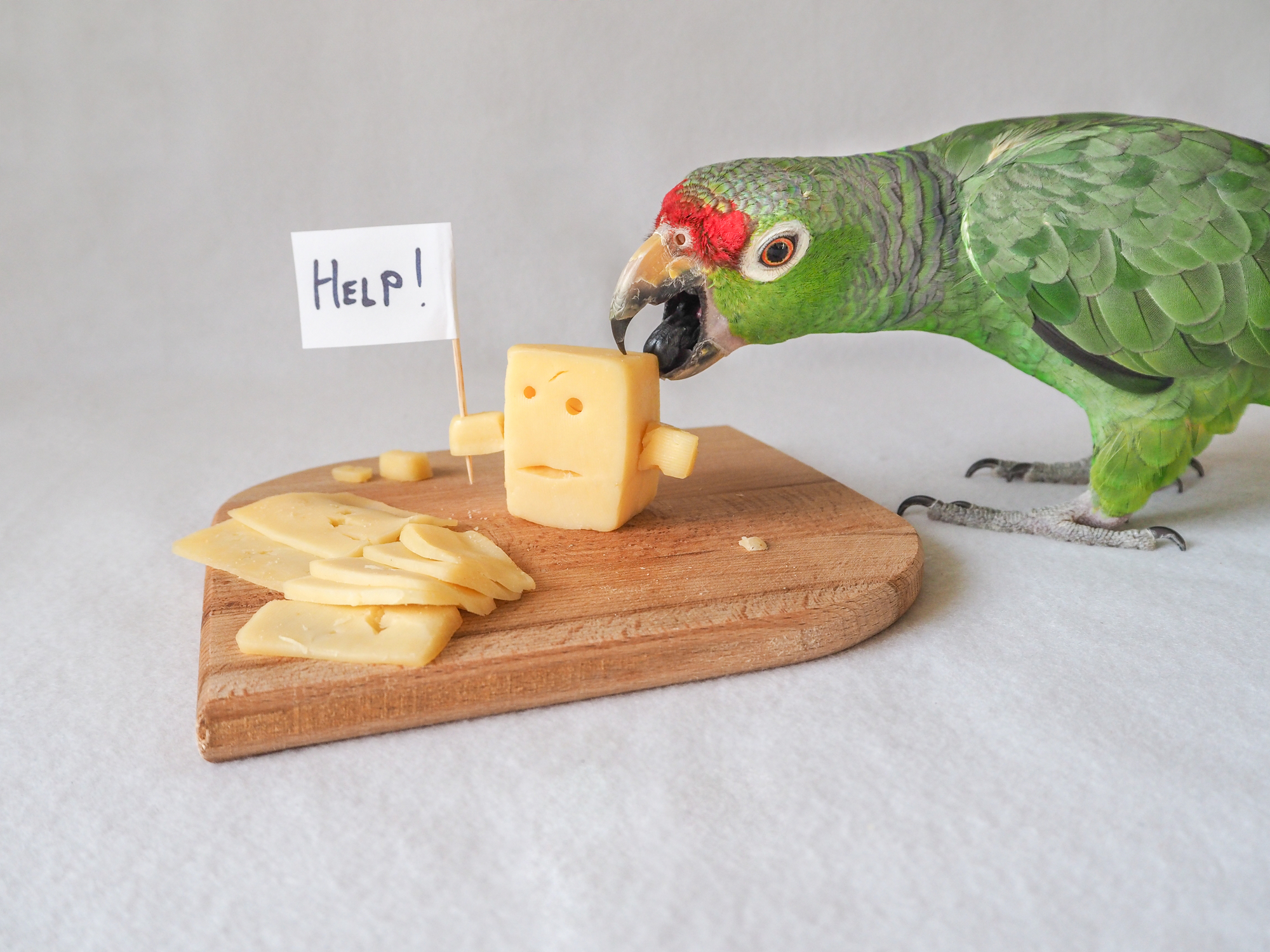It’s hard to find a person who doesn’t love cheese. Whether it’s a pizza with layers of toppings melted together in ooey gooey cheesy goodness, a deep bowl of macaroni simmering in rich cheese, or just the simple pleasure of fresh cheese with a piece of fruit, almost everyone can appreciate cheese.
If you’re a cheese fan, you might be wondering if birds can enjoy this tasty snack, too. Or, if you’ve embraced dairy-free cheese alternatives, you might be wondering if you can share those plant-based human foods with your fine feathered friends.
In this article, we’ll break down everything you need to know before splitting your pack of mozzarella sticks with that flock at your garden feeder.
Can Birds Eat Cheese and Does It Hold Any Nutritional Benefits?
Cheese is a calorie-dense nutritional food and a source of fat, which can help wild birds meet their intense metabolic needs. Birds will show a preference for foods that are efficient sources of energy!
Cheese can serve as a source of protein for birds, although you shouldn’t offer too much.
It’s a good source of calcium, which helps build healthy bones and helps birds to lay eggs. Cheese is also a good source of vitamin B12.
What Types of Birds Like Cheese?
Many kinds of wild and captive birds like a mild cheese. Some birds that might turn up at your feeders if you start offering cheese include robins, wrens, sparrows, blackbirds, and crows.
What Kind of Cheese Can Birds Eat?
Birds can eat small amounts of hard, fermented types of cheeses low in lactose. Such cheeses include mild Cheddar, Provolone, Parmesan, and Swiss. These cheeses have trace levels of lactose.
Avoid giving birds blue cheeses, such as Gorgonzola, Stilton, or Roquefort.
Can Birds Eat Mozzarella Cheese?
Mozzarella is not a good cheese to offer birds. While mozzarella has “low” levels of lactose, its levels are similar to cream cheese and ricotta; cheeses birds should not have. Compare it to the bird-safe cheeses with “trace” levels of lactose.
Also, mozzarella is a fresh, soft cheese rather than a hard, fermented cheese. With three strikes against it, mozzarella is out when it comes to birds.
Can Birds Eat Cream Cheese?
No, birds cannot eat cream cheese or soft, spreadable cheeses like ricotta or brie. Cream cheese is higher in lactose, and birds cannot digest it. It also is likely to be mixed with flavors like onion or garlic, which are dangerous for birds.
Can Birds Eat White Cheese?
Yes, birds can eat white cheese. The color doesn’t change how much lactose is in the cheese, which is the real factor that determines whether birds can eat the cheese or not.
The color of the cheese is partially influenced by which animal produced the milk for the cheese and what kind of diet that animal had.
But today’s store-bought cheeses are almost all dyed with vegetable dyes to meet customers’ expectations for consistent color.
Can Birds Eat Non-Dairy Cheese?
That’s a complicated question because it depends on what ingredients your non-dairy cheese is made from. Some are safe for birds, and some are not.
The key thing to note about non-dairy cheese is that all of it is lactose-free, which is an important first step towards being safe for birds to eat.
Many of the plant-based natural ingredients for vegan cheeses are actually quite nutritious for birds.
Since roasted soybeans are safe for birds, soy-based products are okay. Soy is the basis for many dairy and meat substitutes, including tofu, which is made from soy milk.
Coconut and soy oils are safe for birds to eat but could be problematic if they melt and get on their feathers.
Nut-based cheeses, such as cashew and almond cheese, are nutritious options that birds will likely relish.
If you want to feed a vegan cheese to birds, check the ingredient list first and make sure all the ingredients are safe.
Can Birds Eat Shaker Parmesan Cheese?
Since you know that real Parmesan cheese is safe for birds, you might wonder if the powdered kind that comes in a shaker bottle is safe for birds. This one is a gray area.
If you bought Parmesan cheese in a shaker bottle in the United States, it’s probably not real cheese. Depending on which additives and unexpected ingredients are in the bottle, it’s probably unsafe for birds.
If you want to be sure that the cheese you’re sharing with birds is safe for them to eat, skip the shaker–there are too many unanswered questions.
Instead, get a cheese grater and authentic Parmesan cheese in block form, which is known to be bird-safe, and grate your own.
Can Birds Have Cheese Crackers? Can Birds Eat Cheez-Its?
The Audubon Society cautions us against feeding any kind of crackers to birds because they’re empty calories with no nutritional value. This includes cheese-flavored crackers and sandwich crackers with a cheese filling.
Additional artificial flavorings could also contain unhealthy or dangerous ingredients. Cheesy or not, Polly will pass on that cracker.
Why Can’t Birds Eat Some Kinds of Cheese?
Unlike mammals, birds don’t grow up drinking milk from their mothers. They don’t have any way of digesting the lactose in milk.
Do you have lactose intolerance or know someone who does? It means you don’t have a particular trait called lactase persistence.
Lactase persistence comes from a mutation humans evolved to allow them to keep eating dairy products once they leave the baby stage when mammals can drink milk.
Birds never go through a milk drinking stage and have no lactase enzymes to digest milk. So just like a human with lactose intolerance, dairy products make them sick.
But what for us is an upset stomach, and a bad day can be very serious–even deadly–in a tiny bird.
That’s why any kind of cheese with too much lactose is dangerous for birds and should never be fed to them.
How Should I Feed Birds Cheese?
Finely grate hard, fermented cheese and mix a small quantity with birdseed, then place the grated cheese on your platform feeder.
Cheese should be a small treat, occasionally offered to your backyard bird friends.
Say Cheese!
Birds can eat some kinds of cheese in moderation. Look for hard, fermented cheeses that have only trace amounts of lactose.
Finely grated bits of cheese can be an excellent source of protein and a mineral-rich addition to your birdseed mix. Just remember, cheese is a treat for birds, never the main course.


